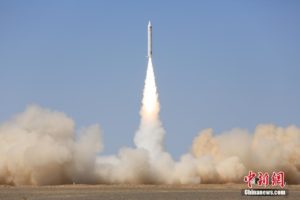
A senior U.S. space official has told SpaceWatch.Global of the Trump administration’s concern that Chinese commercial and trade practices are distorting the international commercial space market, and that the U.S. does not envision any form of space cooperation with China as a result.
In a wide-ranging interview with SpaceWatch.Global, Dr. Scott Pace, the Executive Secretary of the U.S. National Space Council run by U.S. Vice President Michael R. Pence, said, “Not so much a competitor but a potential problem is China. China is becoming increasingly active in commercial space activities and at one level that’s a perfectly normal thing to occur. However, Chinese behaviour in other industrial sectors has had a distorting effect on markets. It has affected patterns of innovation and patterns of ownership.”
Dr. Pace expressed concern that alleged Chinese cyber espionage and theft of U.S. technologies coupled with protectionist policies that favour Chinese companies over foreign competitors skews the commercial playing field and also has potential national security implications.
“We’ve had problems with theft of intellectual property (IP), with domestic Chinese regulations that make it difficult to operate in China without your company being put at a disadvantage. So, China’s behaviour in international commercial markets and other areas raises concerns about how they will behave in the space environment – particularly since space technology tends to be dual use technology. China has a policy of civil-military integration and frankly, something that we might benefit from ourselves. That said, Chinese civil-military integration is quite pervasive,” said Pace.
This poses risks, according to Pace, for countries and non-Chinese companies looking to cooperate with Chinese companies on space and satellite projects.
“…if you are looking to do commercial partnerships in China you are really partnering with the People’s Liberation Army and if that’s ok, fine. But if it’s not okay people need to be aware of it. There’s Chinese money that’s flowing into many investments and our experience in other sectors tells us that that money can often have a distortive effect in terms of the competitiveness of those companies or in terms of loss of IP or of being placed at a disadvantage in comparison with favoured Chinese providers,” Pace said.
Asked whether the Trump administration sees the boom in Chinese commercial space activities as source of competition for the United States, Pace said, “I think China is a concern for us, not a major competitor.”
Dr. Pace’s comments to SpaceWatch.Global echo remarks he made over a week earlier to the Nikkei Asian Review regarding U.S. export controls on space technologies as they apply to China on the one hand, and U.S. friends and allies on the other.
“I don’t see any liberalization or relaxation of space export controls with respect to China…I can imagine some relaxation with respect to close friends and allies,” Pace told the Nikkei Asian Review.
“Even if we do not change anything on the list, dealing with export controls is a difficult and burdensome process, especially for small companies,” he said. “So we want to make the process of compliance easier and smoother with electronic tools.”
This easing of U.S. export restrictions for friends and allies will also extend to space exploration and human spaceflight plans, according to Pace, who cited Japan as an example of such cooperation.
“If Japan is a major strategic partner with us as they have been with the Space Station then I expect that there will be opportunities for Japanese astronauts to be on the Moon with us.”

When asked if this kind of cooperation could be extended to China, Pace said, “Probably not.”
“The reason is that human space flight requires a very, very high degree of trust,” he explained. “China has good capabilities but the political situation is difficult. As a result, trying to build trust in civil space cooperation is very, very challenging.”
In his interview with SpaceWatch.Global, Dr. Pace addressed U.S. concerns that foreign investments in strategic sectors such as space could be national security threats.
“I think you must have continuous multilateral discussions with other countries and partners, just as we do with export controls where we stress that these are enforced for national security purposes and are not being implemented to advantage national champions at home. We do these things because we have clear national security concerns,” he said.
“I think that, in the area of investments, it’s important to talk with our partners and traditional friends and allies to be able to highlight the security threats that we see. If we don’t get them to agree with us, then our ability to enforce investment restrictions or to find bad actors is going to be hurt. This is not something the U.S. can do by itself. We can lead on it and work with other countries on it but we need other countries to recognise that investments by certain entities in certain areas pose security risks and we agree and will cooperate. As we look at space-related investment flow worldwide, the U.S. must take a multinational approach,” Dr. Pace added.
Dr. Pace’s interview with SpaceWatch.Global can be found here and here (paywalled).





